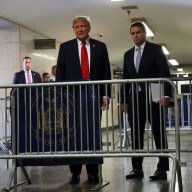The most controversial Hall of Fame class ever turned out to be a class of zero.
The common refrain about Barry Bonds and Roger Clemens is that they were Hall of Famers for the first half of their careers and would have been inducted if their careers continued under normal conditions.
In the last decade, they have become the most prominent names associated with the steroid era that likely started in the 1990s and culminated in the 2007 Mitchell Report.
Clemens and Bonds, along with every other eligible player, missed out on election into the Hall of Fame when the results of BBWAA voting were announced Wednesday afternoon. Performance-enhancing drugs were clearly the reason why.
The effect may have trickled down to other first-time candidates. Nobody was elected to Cooperstown for the first time since 1996, and eighth time ever, as nobody could reach the 75 percent of the vote threshold required for induction.
“The standards for earning election to the Hall of Fame have been very high ever since the rules were created in 1936,” Hall of Fame president Jeff Idelson said. “We realize the challenges voters are faced with in this era. The Hall of Fame has always entrusted the exclusive voting privilege to the Baseball Writers’ Association of America. We remain pleased with their role in evaluating candidates based on the criteria we provide.”
Phil Niekro and Tony Perez topped the ballot in 1996. Both players earned entry in subsequent elections, but neither had any ties to performance-enhancing drugs like Bonds and Clemens.
Clemens, who was linked to performance-enhancing drugs in his two years with the Blue Jays and first five years with the Yankees, received 37.6 percent of the 569 votes. Bonds, who was linked to performance-enhancing drugs after the 1998 season with the Giants, received slightly less at 36.2 percent.
“After what has been written and said over the last few years I’m not overly surprised,” Clemens said in a statement he posted on Twitter. “To those who did take the time to look at the facts, we very much appreciate it.”
The closest anyone came to induction was Craig Biggio. The former Astros’ second baseman and member of the 3,000-hit club received 68.2 percent of the votes, making him 39 votes shy of the necessary 388.
After Biggio, the next-highest total among first-year players was Mike Piazza, who is regarded as the game’s best-hitting catcher. The former Met catcher received 57.8 percent of the vote, which likely was based on some voters having suspicions about steroids even if he has not been linked to them.
“We hope in the not too distant future that Mike Piazza will take his rightful place in the Baseball Hall of Fame,” Mets COO Jeff Wilpon said in a statement released by the team. “The statistics he compiled during his career as a catcher were unmatched by anyone in the history of the game. We are optimistic one day soon, Mike’s plaque with a Mets’ cap will be hanging in Cooperstown where it truly belongs.”
Curt Schilling, whose 11-2 career postseason record made him a strong candidate, received 38.8 percent. Sammy Sosa, another name linked to steroids, was awarded just 12.5 percent.
MLB player’s association executive director Michael Weiner issued a strong statement defending the players who were not inducted, including those suspected of using performance-enhancing drugs.
“Today’s news that those members of the BBWAA afforded the privilege of casting ballots failed to elect even a single player to the Hall of Fame is unfortunate, if not sad. Those empowered to help the Baseball Hall of Fame and Museum document the history of the game failed to recognize the contributions of several Hall of Fame worthy players,” Weiner said in a statement. “To ignore the historic accomplishments of Barry Bonds and Roger Clemens, for example, is hard to justify. Moreover, to penalize players exonerated in legal proceedings — and others never even implicated — is simply unfair. The Hall of Fame is supposed to be for the best players to have ever played the game. Several such players were denied access to the Hall today. Hopefully this will be rectified by future voting.”
Among the holdovers, pitcher Jack Morris was the closest at 67.7 percent of the vote. Morris, who is one of three pitchers in the modern era with at least 254 wins and fewer than 300 wins not in the Hall of Fame, has one more year on the ballot. His total increased by one percent from last year and 14 percent in the last two years.
Jeff Bagwell was another holdover in his third year of eligibility. Bagwell’s total increased from 56.3 percent to 59.6 percent, but he also has some steroid suspicions about him.
While Bonds and Clemens could see their totals increase, they may suffer the same fate as Mark McGwire and Rafael Palmeiro.
McGwire received 23.5 percent of votes in his first year in 2007 but this year he was reduced to getting 16.9 percent. Palmeiro received 11 percent in his first year in 2011 but just eight percent this year.
Follow Yankees beat writer Larry Fleisher on Twitter @LarryFleisher.
















